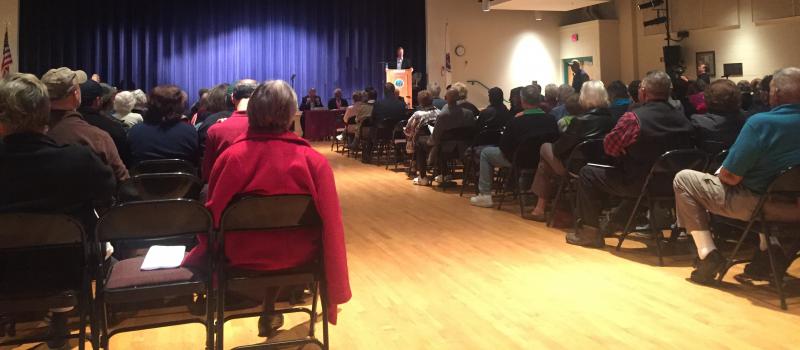Residents reject plan to set aside energy savings
Fall Town Meeting voters said “no” to earmarking energy savings for specific accounts.
The town began receiving its energy from wind turbines in Plymouth during the summer and expects to save $80,000 to $10,000 a year. Originally, the town expected the savings to come in net metering credits, meaning the town would pay less for electricity. Instead, Eversource decided to make payments to the town in cash.
The agenda item would have designated that the funds be split equally into two accounts: the OPEB fund and a new energy efficiency account.
Currently, the town has a liability exceeding $8 million for OPEB, which stands for other post employment benefits and includes cost such as health care for retired town workers. The Town Meeting proposal would have provided a reliable flow of cash into the fund. The Energy Efficiency Account would have been used by the Energy Management Committee to make improvements to the town to increase the efficiency of energy use.
The Finance Committee proposed an amendment, suggesting that 60 percent of the savings go to OPEB and 40 percent go to the Energy Efficiency Account.
Resident Helen Westergard supported the town’s choice to enter into the wind agreement to save money but questioned why town officials felt like the money needed to be immediately spent.
“We’re looking to spend the savings,” she said. “We usually fund OPEB from Town Meeting, why should we immediately feel like we have to spend this money? Why can’t we use the funds to reduce taxes?”
According to Town Administrator Paul Dawson, any revenue, such as these cash payments from Eversource, would go automatically to the free cash fund and be absorbed into the operating budget. In order to use it for anything, it would need to be appropriated by voters.
Some residents agreed that using some of the money for OPEB was a good idea but didn’t think the rest of it needed to be used.
“The first part sounds great. It makes sense,” resident Chris Collings said, “but why earmark the second part? Why not put it straight into free cash?”
Voters couldn’t agree on appropriating the savings, and the article failed.














